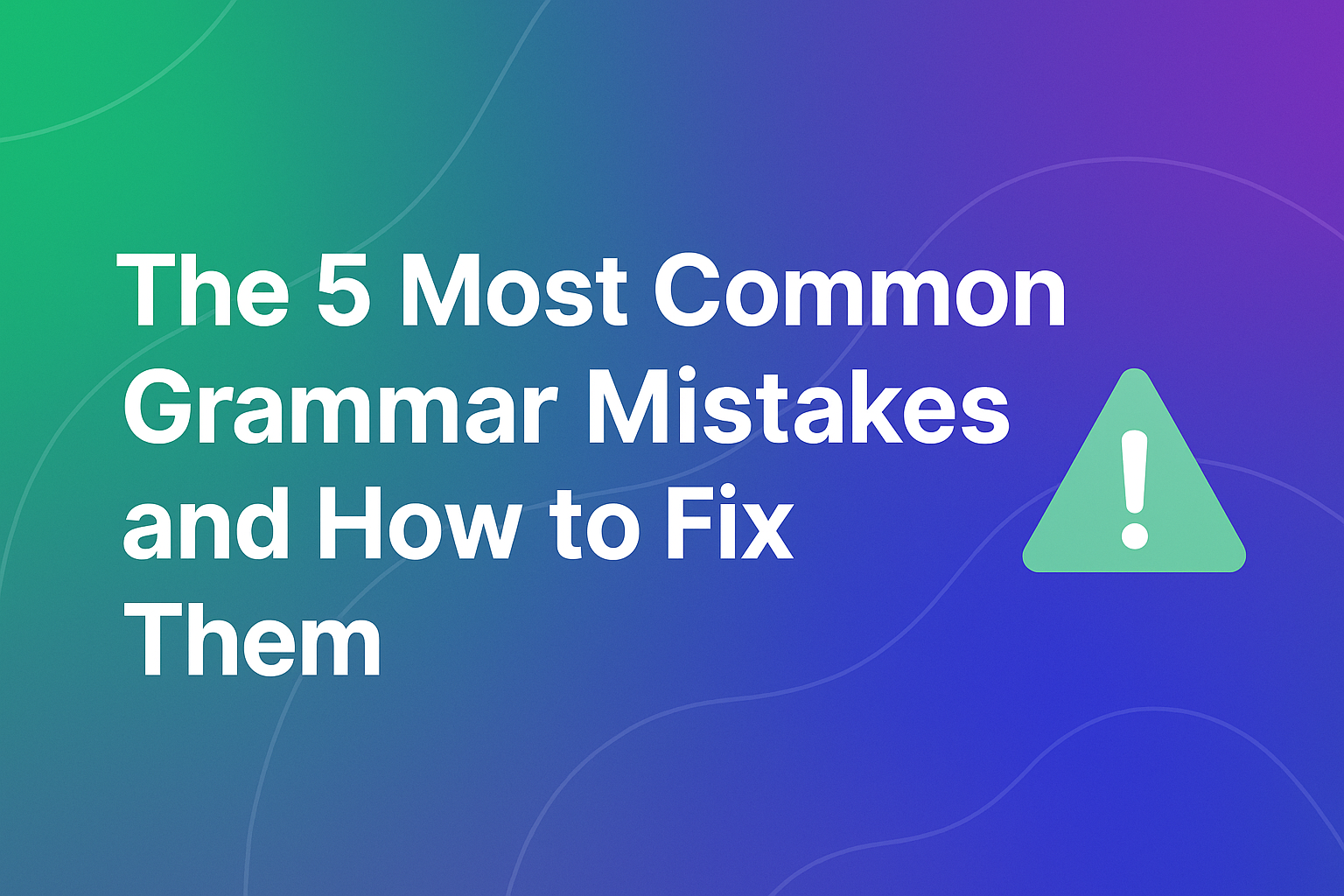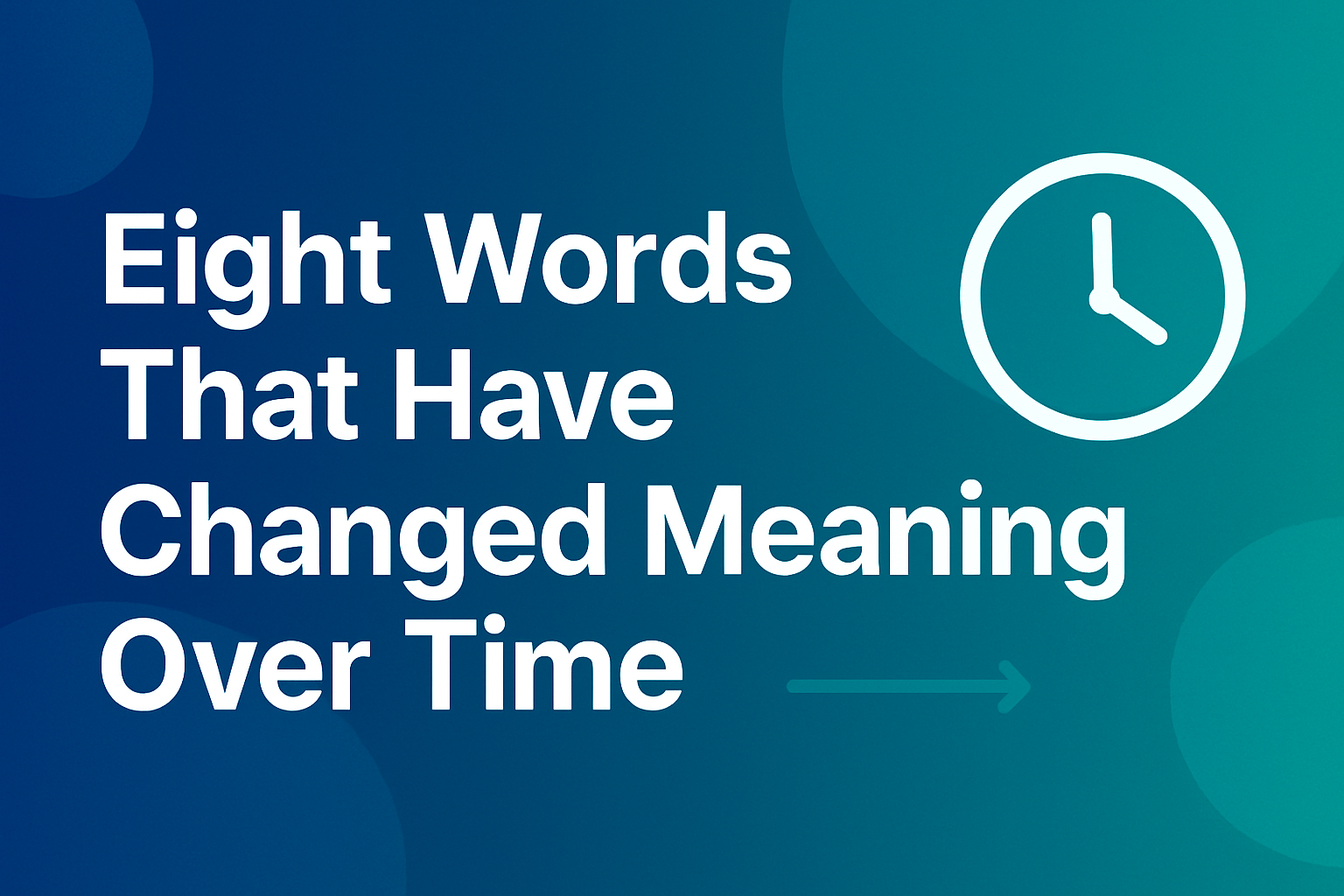
The 5 Most Common Grammar Mistakes and How to Fix Them
Improve your writing by learning to identify and correct the five most frequent grammar errors that even experienced writers make.
Read articleCheck your papers for plagiarism with our advanced AI tools


Language is constantly evolving. Words that meant one thing to our grandparents might mean something entirely different today. This fascinating phenomenon, known as semantic change, reflects cultural shifts, technological advances, and the natural evolution of how we communicate. Let's explore eight words that have dramatically changed their meanings throughout history.
Original meaning: Foolish, stupid, ignorant
Current meaning: Pleasant, agreeable, kind
Few people using the word "nice" today realize that they're employing a term that once meant almost the opposite of its current definition. Derived from the Latin "nescius" meaning "ignorant," when "nice" entered English in the 13th century, it was used to describe a foolish or silly person. By the 16th century, it had shifted to mean "precise" or "careful," and eventually evolved into the generally positive term we use today.
The journey of "nice" demonstrates how dramatically a word's connotation can shift from negative to positive over time.
Original meaning: Inspiring wonder, full of awe
Current meaning: Extremely bad or unpleasant
"Awful" began as a term literally meaning "full of awe" or "inspiring wonder." It was used to describe impressive and majestic things, often with religious connotations. A cathedral might be described as "awful" in the sense that it inspired awe in those who beheld it.
By the late 1700s, the word began taking on more negative connotations, and by the early 20th century, it had completed its transformation into the entirely negative term we use today.
Original meaning: Happy, carefree, bright and showy
Current meaning: Homosexual, relating to sexual orientation
The word "gay" has undergone one of the most notable semantic shifts in recent history. From the 12th to the early 20th century, "gay" primarily meant "joyful," "carefree," or "bright and showy." It appears with this meaning in countless works of literature and song lyrics from earlier eras.
In the 1920s and 1930s, the word began to be used in underground communities to refer to homosexuality. By the 1960s, this usage became more widespread, and today it's the primary meaning of the word, though the original meaning is still preserved in certain phrases and older texts.
Original meaning: In a literal manner, exactly
Current meaning: Used for emphasis while not being literally true (in addition to its original meaning)
Perhaps no word has caused more debate among language purists than "literally." Traditionally, it meant "in a literal manner" or "exactly," as opposed to figuratively. However, it has long been used hyperbolically for emphasis, as in "I was literally dying of embarrassment."
This contradictory usage has become so common that many dictionaries now include the figurative definition, much to the chagrin of those who insist on linguistic precision. This is an example of a word that has expanded its meaning rather than completely changing it.
Original meaning: To make by hand
Current meaning: To make using machinery, mass production
The irony of "manufacture" is embedded in its etymology. It comes from the Latin "manu" (hand) and "factura" (making), literally meaning "to make by hand." When the term originated in the 16th century, it accurately described the handcrafting process.
The Industrial Revolution changed everything. As production shifted to machines, the word stayed the same, but its meaning evolved to describe precisely the opposite of its original definition—making goods using machines rather than human hands.
Original meaning: A ball of thread
Current meaning: A piece of evidence or information that helps solve a problem
The evolution of "clue" ties directly to Greek mythology. It originated from "clew," meaning a ball of thread or yarn. In the myth of Theseus and the Minotaur, Ariadne gives Theseus a ball of thread to help him find his way out of the labyrinth after slaying the Minotaur.
By the 17th century, "clue" had taken on its metaphorical meaning of something that guides one through a puzzling situation. Today, the original meaning is largely forgotten, and we exclusively use it to refer to helpful information for solving problems or mysteries.
Original meaning: Full of artistic skill, crafted with art
Current meaning: Made or produced by humans rather than occurring naturally
"Artificial" derives from the Latin "artificialis," meaning "of or belonging to art." When first used in English during the 14th century, it was a compliment, suggesting something was made with skill and craftsmanship.
Over time, as the distinction between natural and human-made became more culturally significant, "artificial" shifted to simply mean "made by humans." By the 19th century, it began to acquire negative connotations of being fake or inferior to what is natural—a meaning that continues to color our understanding of the word today, especially in phrases like "artificial ingredients."
Original meaning: Sweetheart, darling
Current meaning: A person who uses strength or power to harm or intimidate others
Perhaps the most surprising transformation on our list belongs to "bully." In the 16th century, "bully" was a term of endearment similar to "darling" or "sweetheart." Shakespeare used it this way in several plays.
By the 17th century, it had come to mean "fine fellow" and was often used to describe a gallant soldier or protector. The negative connotation began to emerge when it started referring to "blusterers" who were all talk, eventually shifting to describe those who use their strength to intimidate others—the definition we recognize today.
Several linguistic mechanisms drive these semantic shifts:
These changes reflect broader societal shifts, technological developments, and cultural values. They remind us that language is not static but a living, evolving system that adapts to the needs and experiences of its users.
The evolution of these eight words demonstrates the fluid nature of language. Far from being set in stone, the meanings we associate with words shift gradually over generations, sometimes transforming so completely that their original definitions would be unrecognizable to today's speakers.
This linguistic evolution serves as a reminder that language belongs to its users, not to rulebooks or authorities. As society changes, so too will the words we use to describe our experiences—a process that has been ongoing for as long as humans have been communicating and will undoubtedly continue into the future.
The next time you call something "nice" or complain about an "awful" situation, remember that you're participating in the fascinating, centuries-long evolution of the English language.

Improve your writing by learning to identify and correct the five most frequent grammar errors that even experienced writers make.
Read article